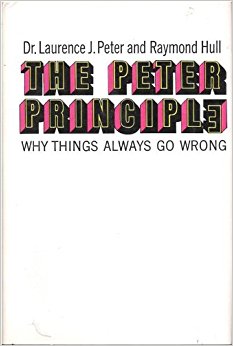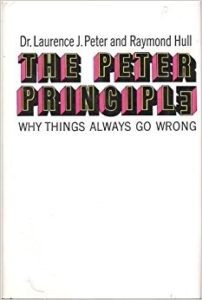“Every employee rises to his level of incompetence.” This is the principle introduced in this classic work of humorous but often true insight into the hierarchies of business.
The Peter Principle (William Morrow & Company, 1969, 180 pages, $4.95 hardback) by Laurence J. Peter and Raymond Hull is one of eleven books (including a four-volume teaching system) by Laurence J. Peter (1919-1990), many of them expansions or variations on The Peter Principle. Raymond Hull (1919-1985) wrote two other books and three plays. Peter was a lifelong teacher, a professor of education at the University of Southern California.
If you’re good at your job, you get promoted. If you’re good at that job, you get promoted again. But eventually, you’ll get promoted to a job you can’t do, even if this job has to be created especially for you. In this way, every employee becomes incompetent at some point, and every position is eventually filled by an incompetent person. The principle is now taught in business schools and has become a trope in our society.
In The Peter Principle, Peter and Hull state that there are no exceptions to the Peter Principle, and describe various scenarios in which the Principle is proven to be true, even if it appears not to be. These scenarios are given scientific-sounding names like “Lateral Arabesque” and “Hypercanino-phobia Complex”. The author refers to himself as the first “Hierarchiologist.”
The book is entertaining and pokes fun at business society in the same way that the movie Office Space did. First published in 1969, it stands the test of time well, and the concepts still reflect reality after the passing of nearly 50 years. It is a classic to which anyone who works for a medium-to-large-size company can relate.


